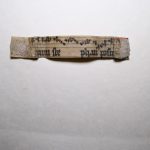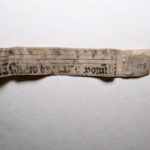The small fragment, supposedly from the spine of the host volume, was found with several other non-musical fragments in a plastic filing sleeve in a cabinet holding the volumes of the Old Hungarian Library’s storage room, in the summer of 2020. The mother codex of the fragment was most likely a Cistercian antiphonal. This presumption is supported by the chants fortunate surviving on both sides of the fragment, and their particular musical characteristics. The recto preserved the responsory Pretiosus athleta Domini Stephanus. The responsory, which was definitely included in a Nocturn of Stephen the First Martyr’s Matins, appears throughout Europe in monastic use, almost exclusively in sources presenting the Cistercian selection of chants. Apart from the single antiphonal of the Augustinian source group of Klosterneuburg, (Klosterneuburg, Augustiner-Chorherrenstift, Bibliothek, sign. 1011, CANTUS: http://cantus.uwaterloo.ca/source/123654), its all known sources are of Cistercian origin (comp. CANTUS: http://cantusindex.org/id/601873). On the verso the torso of the chant Mortem enim quam salvator was preserved, which is the verse of one of the following responsories of the Matins. This verse is not a curiosity: it has a stable place in the chant traditions of Central-Europe, including Hungary, on the side of the Stephanus-office’s Lapides torrentes responsory in mode 7 (comp. László Dobszay – Janka Szendrei, Responsories, Budapest: Balassi Kiadó, 2013, nr. 7117). From the melody shreds that survived on the fragment, however, we do not get the quite agile verse-melody of mode 7, but a recitative melody, almost entirely in a sole, presumably d-tone. On the basis of the comparative source research, we can be almost certain that this melody belonged to the 4th mode Mortem enim verse. The visible notes in the fragment allows us to reconstruct a transposed 4th mode. Though, this 4th mode variant of the Mortem enim verse, did not belong to the Lapides torrentes, but to the responsory Patefactae sunt ianuae caeli, and its unique transposition is typical of the Cistercian sources, which also contain the responsory Pretiosus athleta Domini Stephanus. The Cistercian origin of the fragment is thus twofold confirmed.
Zsuzsa Czagány



